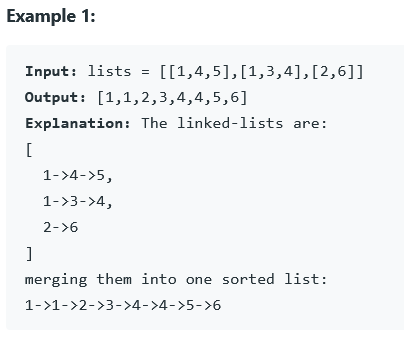
You are given an array of k linked-lists lists, each linked-list is sorted in ascending order.
Merge all the linked-lists into one sorted linked-list and return it.

제한사항
- k == lists.length
- 0 <= k <=
- 0 <= lists[i].length <= 500
- <= lists[i][j] <=
- lists[i] is sorted in ascending order.`
- The sum of lists[i].length won't exceed .
접근1
정렬된 ListNode들이 주어졌을 때 이를 합친 정렬된 노드를 반환하는 문제였습니다.
병합 정렬의 Merge 응용문제구나! 하고 list 내 요소를 접근해서 가장 작은 것을 정답에 추가하는 방식으로 전개를 해서 풀었습니다.
답안
/**
* Definition for singly-linked list.
* public class ListNode {
* int val;
* ListNode next;
* ListNode() {}
* ListNode(int val) { this.val = val; }
* ListNode(int val, ListNode next) { this.val = val; this.next = next; }
* }
*/
public class Solution {
public ListNode mergeKLists(ListNode[] lists) {
if(lists.length <= 0)
return null;
ListNode ret = null, lastNode = null;
ListNode ret2 = null;
while(true){
int minValue = Integer.MAX_VALUE;
int minNodeIndex = 0;
boolean isEmpty = true;
for(int i = 0; i < lists.length; ++i){
if(lists[i] == null)
continue;
int value = lists[i].val;
if(minValue > value) {
minValue = value;
minNodeIndex = i;
isEmpty = false;
}
}
if(isEmpty)
break;
// If it's first time
if(null == ret){
ret = new ListNode();
ret2 = ret;
}
ret.val = minValue;
ret.next = new ListNode();
lastNode = ret;
ret = ret.next;
lists[minNodeIndex] = lists[minNodeIndex].next;
}
if(null != lastNode)
lastNode.next = null;
return ret2;
}
}접근2
정답은 냈지만, 속도가 느려 이번에도 상위 랭킹의 답안을 보았어요.
그리고 해당 로직을 병합 정렬Merge Sort처럼 분할 정복Divide-and-conquer해서 Merge하는 것을 발견했습니다!
매번 lists 요소들을 순회 접근해서 비교해 인 제 풀이와 달린 이 풀이는 의 속도를 보이는 것이었죠!
병합 정렬Merge Sort을 하드코딩이 가능할 때까지 연습했는데 응용까지 못했던 점에 대해 반성하게 됩니다...
답안
/**
* Definition for singly-linked list.
* public class ListNode {
* int val;
* ListNode next;
* ListNode() {}
* ListNode(int val) { this.val = val; }
* ListNode(int val, ListNode next) { this.val = val; this.next = next; }
* }
*/
class Solution {
public ListNode mergeKLists(ListNode[] lists) {
if (lists == null || lists.length == 0) {
return null;
}
return mergeLists(lists, 0, lists.length - 1);
}
ListNode mergeLists(ListNode[] lists, int lo, int hi) {
if (lo == hi) {
return lists[lo];
}
int mid = lo + (hi - lo) / 2;
ListNode l = mergeLists(lists, lo, mid);
ListNode r = mergeLists(lists, mid + 1, hi);
return merge(l, r);
}
ListNode merge(ListNode l, ListNode r) {
ListNode dumb = new ListNode(-1);
ListNode p = dumb;
while (l != null && r != null) {
if (l.val < r.val) {
p.next = l;
l = l.next;
} else {
p.next = r;
r = r.next;
}
p = p.next;
}
if (l == null) {
p.next = r;
} else {
p.next = l;
}
return dumb.next;
}
}